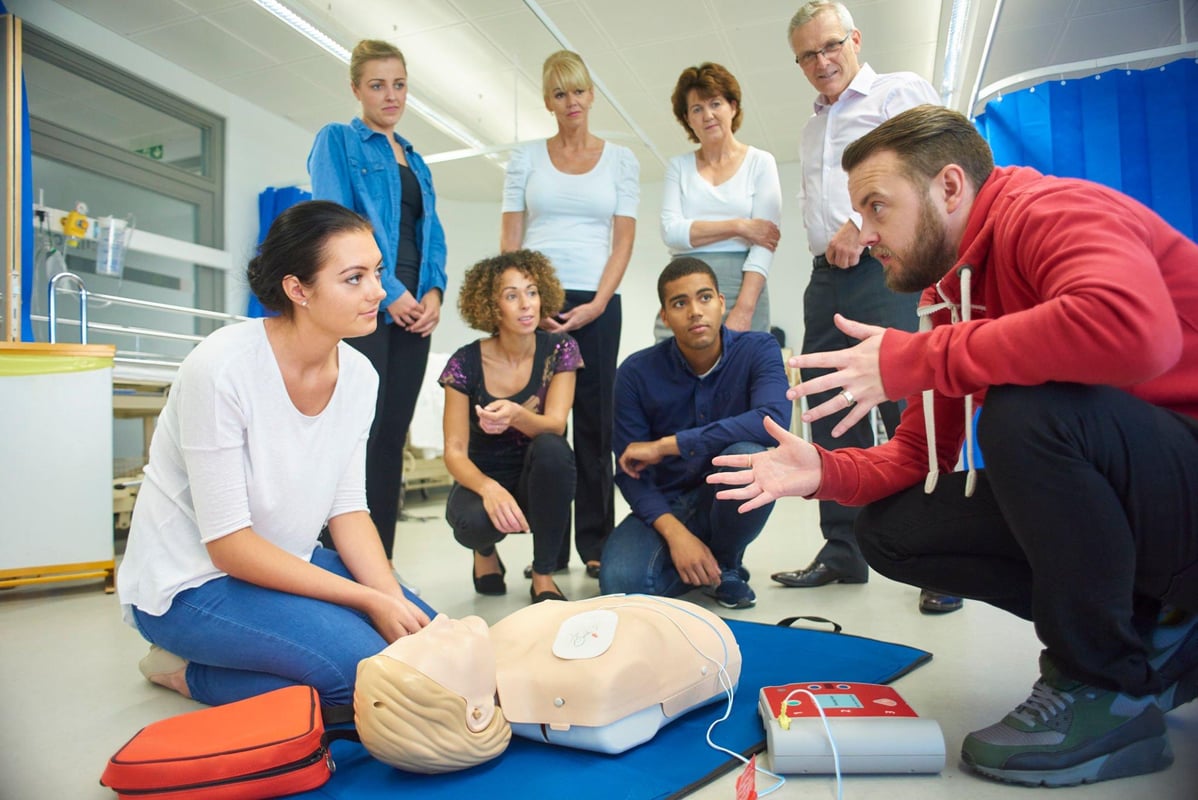No cost info
No cost info
$1,300 total
$125 total
$85 total
No cost info
No cost info
No cost info
$36.50 total
No cost info
Living in Detroit and looking for a first aid class near you? You've landed at the right place. This blog post will guide you through the various aspects of first aid training, including what first aid is, the requirements for the training, how to choose the ideal class, what to expect from the class, the certification process, and how to find related jobs. We'll also explore what other classes you can take after becoming a first aid. Let's dive in!

First aid refers to the initial assistance or treatment given to a person who is injured or suddenly falls ill before professional medical help arrives. The main aim of first aid is to preserve life, prevent further harm, and promote recovery. It includes simple techniques like bandaging a wound to performing chest compressions and using an AED.
To sign up for a first aid class, there are usually no specific educational prerequisites. However, there are a few things to consider:
Age: Most providers require students to be at least 16 years old.
Physical Fitness: As first aid training involves practical elements, a basic level of physical fitness is required.
Language Proficiency: Since the classes are usually conducted in English, a certain level of language proficiency can be beneficial.
When choosing a first aid class, consider the following:
Accreditation: The program should be accredited by a recognized organization like the American Heart Association or the Red Cross.
Course Content: The course should cover all essential first aid techniques, such as CPR, using an AED, handling emergencies like choking, bleeding, or shock.
Class Size: Smaller class sizes offer more personalized instruction.
Practical Training: Hands-on training is crucial for mastering first aid skills.
First aid classes typically involve a mix of theoretical and practical learning. You can expect:
Lectures and Discussions: To understand the principles of first aid and emergency response.
Practical Demonstrations: To learn and practice skills like CPR, wound dressing, and using an AED.
Scenarios and Role Play: To simulate real-life emergencies and apply learned skills.
Once you've completed the training, you'll need to pass an assessment to earn your first aid certification. This usually involves a written test and a practical evaluation. Upon passing, you'll receive a certificate valid for two years.
First aid certification can open the doors to various job opportunities, particularly in the healthcare sector. Jobs like a Certified Medication Aide, EMT, or Medical Office Specialist often require first aid knowledge. You can find more about these jobs at Dreambound and explore the various vocational training programs related to healthcare in Michigan.
Once you've obtained your first aid certification, you can consider taking more advanced classes, such as:
Advanced First Aid: For more complex techniques and procedures.
Pediatric First Aid: Specializing in first aid for infants and children.
Wilderness First Aid: Training for providing first aid in remote and outdoor settings.
Understanding first aid is not just beneficial for your career, but it's also a valuable life skill. It empowers you to respond effectively in emergencies, potentially saving lives.
Some first aid courses are tailored for specific groups, such as childcare providers, teachers, or sports coaches. These courses focus on the common injuries and illnesses these groups are likely to encounter.
When providing first aid, it's important to understand the legal considerations. Good Samaritan laws protect first aiders who act in good faith, but it's crucial to gain consent before providing aid and to only perform procedures you're trained for.
First aid techniques evolve, and skills can fade over time. Therefore, it's crucial to refresh your first aid knowledge regularly. Most certificates are valid for two years, after which you should take a refresher course.
First aid training equips you with the knowledge and confidence to respond effectively during emergencies, both in your personal and professional life. Whether you're looking to enhance your job prospects in healthcare or simply want to be prepared for emergencies, first aid training is a valuable investment. Remember, the right training can make all the difference in an emergency. Choose a reputable and accredited program that best suits your needs and career goals.
Dreambound's extensive guides dig into the specific requirements and challenges that are different for each city in the US. Check out some of our other guides below:
Thinking about a potential career transition? Dreambound has detailed guides to help you with making informed decisions.
Dreambound's platform allows prospective students to find the right educational program for them through searching, filtering, and connecting with our extensive selection of career & technical education partners.
Dreambound has over 70 programs across healthcare, technology, business, and industrial trades. This includes programs such as Medical Billing, Cybersecurity, and welding.
Some of our schools offer financial aid for those who qualify. Many others offer payment plans, where you can pay the cost of class over time.
Yes, Dreambound offers many online programs. On Dreambound's search, you can filter by online, in-person, and hybrid (part online, part in-person).
Dreambound is completely free for you to use! We are supported by schools and organizations who pay to advertise on our website, so we can offer all of our career resources for free.